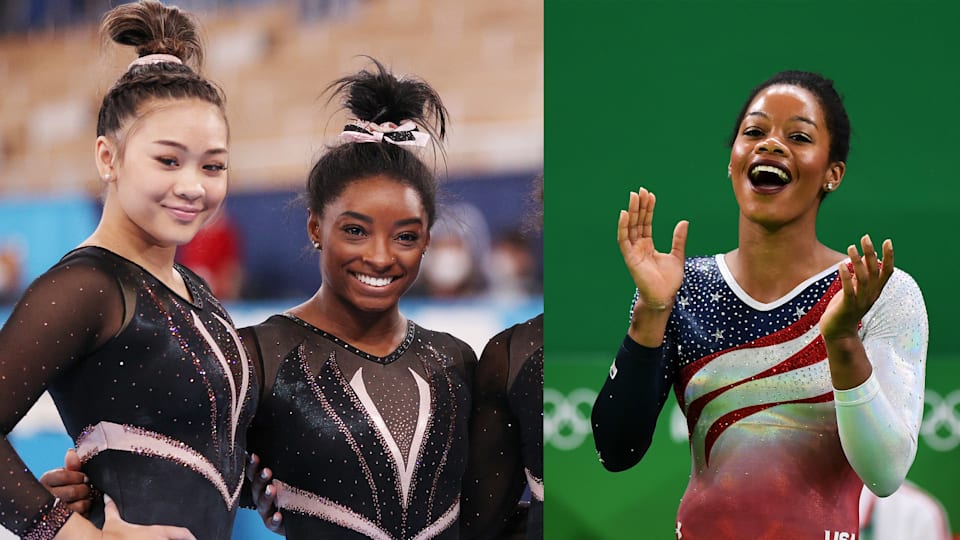
Michael Jordan, Charles Barkley, 'Magic' Johnson and the 1992 “Dream Team” might have competition next summer at the Paris 2024 Olympic Games.
The three legendary basketball players formed the backbone of Team USA’s Olympic gold medal-winning squad at the 1992 Games in Barcelona, Spain, after a change of rules allowed professionals including NBA players into the Games for the first time.
But one of the greatest sporting teams ever assembled could also be put together in July as U.S. gymnasts Gabby Douglas, Simone Biles and Sunisa Lee dream of return trips to the Games.
The trio represent the last three women to claim Olympic all-around gold in women’s gymnastics, part of a run of five in-a-row for the U.S. that also includes 2008 champion Nastia Liukin and 2004 winner Carly Patterson. The quintet are the only American women to take the title at a fully attended Games.
“I don’t think there’s anything that would ever compare to [all three making the team],” said Liukin in an exclusive interview. “Sure, the Dream Team, it was the absolute greatest of greats. I think that is what this is, but what it makes it even more unique and different is that… it is only one person every four years.”
“The longevity with all three of the girls that are still competing is really, really cool,” Patterson told Olympics.com. “It would be one of those things where all the stars are just aligning because it’s hard enough for one person that is coming back four years later who was just on an Olympic team to make that next one, but to have three of them, if all three of them made it, that would be remarkable.”
The challenges of returning to compete
Patterson is right.
Returning to the Games after taking all-around gold is difficult and something that hadn’t been done by any female winner since the legendary Nadia Comaneci returned to the 1980 Games after securing the all-around crown four years earlier in Montreal.
Douglas and Biles did the same more than 30 years later.
Liukin and Patterson say part of the challenge that comes with returning to the sport’s biggest stage is the way life changed after their golden triumphs as a new world of opportunity opens up.
“I didn’t see what happens after you win an Olympic gold medal [as a kid],” explained Patterson. “So, when that happened for me, I truly did not know what to expect or what life was going to look like after the Olympics.
“I thought I was going to go home and go right back into the gym and just keep doing what I always did because that was my life and all I knew was being in the gym every day," she continued. "When I got home, I realised, ‘Oh, life is really different.’”
While Douglas, Biles and Lee all enjoyed their moments in the sun following their Olympic triumphs, each found their way back to the sport with Douglas continuing to the Rio Games, Biles returning for the Tokyo Games and Lee competing first in collegiate gymnastics before returning to elite competition last summer.
Each has hinted at a love for the sport - and unfinished business.
“I think you obviously have to have a passion if you want to continue going, especially after you’ve reached the pinnacle of what you can do in your sport,” said Patterson. “The passion definitely has to be there for you to continue after something like that.”
Liukin, who attempted to make the 2012 U.S. Olympic team, agreed: “I still loved the sport, that love has never gone away or changed,” she said of her career’s continuation. “What I struggled with the most was, 'wait, just because I achieved that thing, which I’m so proud of… why is that I need to now move on or why is it expected that you do it and you’re done?'”
With Douglas, Biles and Lee all shooting for subsequent Games, the dynamic of those expectations has shifted.
But that doesn’t mean any of it has been easy.
“I truly think it’s the mental challenge,” said Liukin of the hardest part of returning to form. “The mental challenge of so many different things: trying not to compare yourself to the Nastia or the Gabby or whoever that you were four years, six years ago, the outside noise, everybody telling you are or you’re not good enough, and then on top of that social [media].
“It’s the mental challenge of every single day,” she continued, “I think when the lights are on and the media is there and you’re on the floor, that’s the easier part. It’s the everyday grind that I would say – for me at least – was the most challenging.”
Whether this trio can pull it off, the possibility is unprecedented – as would seeing all three compete on the same competition floor.
“I honestly can’t even imagine what that’s going to be like, regardless of the outcome, I think just for [the three of them] to walk out onto to that floor or be present in the arena, I don’t know if that will ever, ever happen again, to be completely honest, even at a national championships,” said Liukin. “That in itself is history that I’m not sure will ever be recreated again.”
